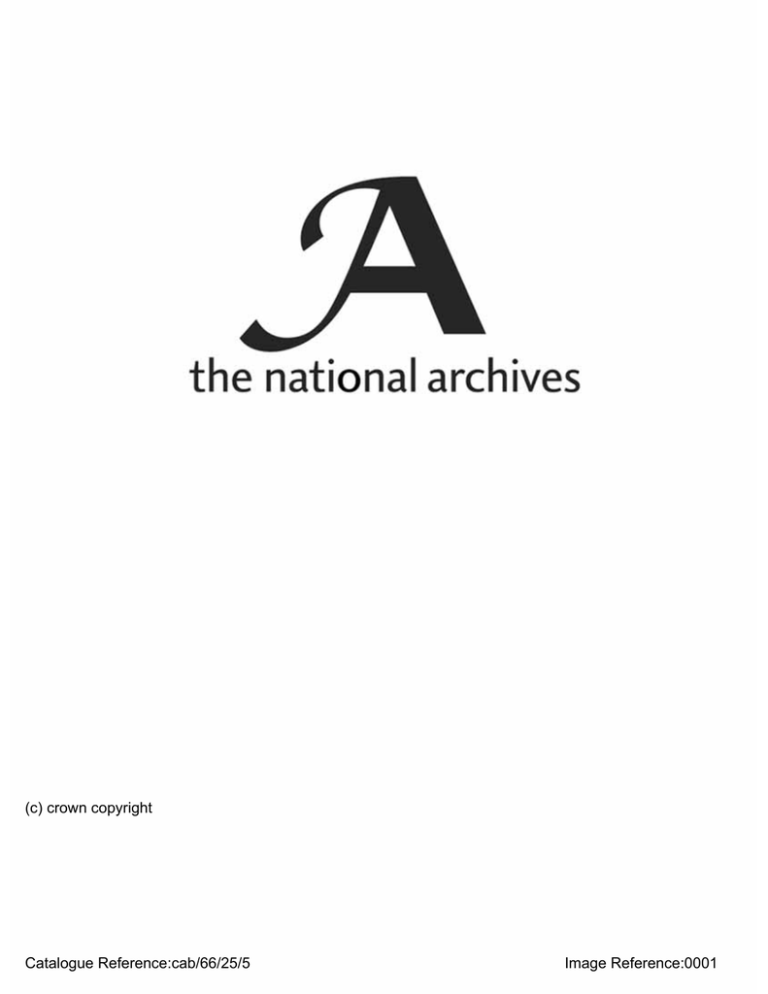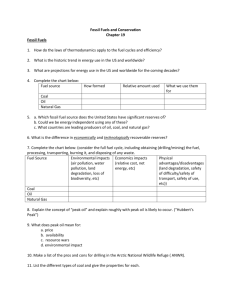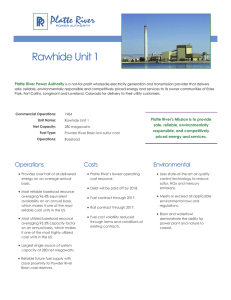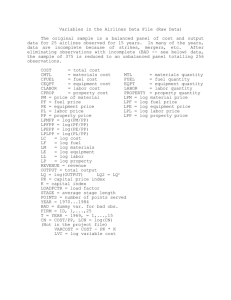(c) crown copyright Catalogue Reference:cab/66/25/5 Image Reference:0001
advertisement

(c) crown copyright Catalogue Reference:cab/66/25/5 Image Reference:0001 DOCUMENT IS THE PROPERTY OP HID BRITANNIC MAJESTY S GOVERNMENT) 1 I I SECRET c TO BE T " p f TJNDTR 1155K"AND"KEY" It is requested thai special care may be taken to W P (48) 225ensure the secrecy of this document. ^fiTH MAY, 1942, WAR CABINET * COPY NO, FUEL RATIONING-. Memorandum by the President of the Board of Tradeo 1, At its meeting on May 12th (W.M.(42) 62nd Conclusions) the \7ar Cabinet invited rne to bring before the Lord President's Committee the draft White Paper containing ray proposals for fuel rationing, and asked that the Committee, in examining the scheme, should consider to what extent adjustments could be made to meet substantially the main objections put forward by the cutties 2 On May 26th the Lord President s Committee considered a revised draft White Paper (attached) and also an--alternative scheme which, in my opinion, represented the best that could be devised if, on political grounds, it were felt impossible to introduce a Points and Coupons scheme 1 n 3 The Committee agreed unanimously that, if domestic fuel was to be rationed, the White Paper plan "was greatly to be preferred, and, indeed, so far held the field as the only practical rationing scheme devised." 0 H. D * pd of Trade, pay 28th, 1942 a DRAFT WHITE FUSL PAPER RATIONING His Majesty's Government, after full consideration of the views expressed in the Debate in the Mouse of Commons on 7th May, have decided on the following scheme of fuel rationing. (l) In order to secure an equitable distribution of fuel, as well as a necessary reduction in the total domestic consumption, all consumers of solid fuel must be registered with a coal merchant or distributor. An Order to this effect has already been made. This will enable available supplies of coal and coke to be distributed between merchants roughly in proportion to the number of their registered customers. ' (2) There will be a fuel ration for each householdj and, in addition, a fuel ration for each person, including Children. (3) The ration will be fixed in cvrfc. of coal. But a consumer can take part of his ration in other fuels - coke, gas, electricity or paraffin. These will be interchangeable according to a points system on the basis that - 1 cwte of coal or coke equals 5 therms of gas or 100 units of electricity or 2 gallons of paraffin. (4) The household ration will be fixed for each household by an assessment of present needs according tc a simple scale as shown below, (parai.17) The ration will depend on ­ (a) The locality of the household. For climatic reasons, a higher scale will be given for Scotland and the North of England than for the Midlands which in turn will have a higher scale than London and the South. (b) The number of habitable rooms in the house.(excluding scullories, bathrooms etc.; (d) In the case.of houses with more than seven habitable rooms, i/he number of residents- The making of these assessments will be a very simple matter involving no exercise of judgment by any official, but only the tabulation of facts. 85 per cent, of all households contain seven habitable rooms or less. (5) The personal ration will be the same for all persons whether young ­ or old. It will be 7-g- cwt. a year per head. Thus a family of four persons will be entitled to a total personal ration of 1-g- tons in addition to their household ration. (6) A supplementary ration may also be given for special needs, such as sickness necessitating additional fuel, bomb damage, the use of a house for business premises, etc. These supplementary rations will be granted by the Local Fuel Overseer. They are the only part of the ration which requires the exercise of discretion by any official, and even this will be largely reduced by the issue of simple rules dealing with the most common cases. (7) The question of miners' coal will be specially dealt with, after full consultation with representatives of miners and mine owners.­ (8) Any householder applying for a supplementary ration who is not satisfied with the decision of the Local Fuel Overseer, will, in accord with rules to be made by the Board of Trade, have a right of appeal. (9) The rationing period for coal) coke and paraffin will begin on the 1st July 1942 and will run to the 1st July 1943* All coal, coke and paraffin delivered to the householder on or after 1st July 1942 will count against his ration for these twelve months. Likewise, any stocks of coal or coke in excess of one ton held on 1st July 1942 will count against the ration. Within the limits of their ration, householders will be encouraged to stock up during the sunsmer months. (10) The rationing period for gas and electricity will also run from approximately 1st JuTy, i.e. from the first quarterly meter reading after 1st October. (li) During any half year, electricity consumption in any household must not exceed the consumption in the corresponding six months of the previous year, except with the consent of the Local Fuel Overseer. (l2) Any small excess of consumption of electricity or gas, over the amounts permitted under either (3) or (ll), will be reported to the Local Fuel Overseer and carried forward and deducted from the ration in the next period. Any larger excess may be subject, on the initiative of the Local Fuel Overseer, to prosecution and a maximum fine of, say, ten times the price per unit of the excess. In cases of flagrant and deliberate excess, supplies will be cut off, if so ordered by the Court. It is not anticipated that such cases will be at all common. (13) Establishments, i. e. buildings other than domestic or industrial premises viz. schools, hospitals, hotels, business offices, shops, restaurants "and places of entertainment, etc., will be rationed on the basis of their consumption of fuel in a preceding period. The amount of the reduction will be determined by the Local Fuel Overseer with a right of appeal. In exceptional circumstances an increase may be allowed. In addition to rationing, establishments will be subject to restrictions directed to prevent extravagant or unnecessary use of heat and light. An Order restricting advertisement lighting has been made by the Board of Trade. (14) Fuel rationing can only operate fairly and effectively by means of coupons, but steps will be taken to minimise any inconvenience which the use of these may cause. Each householder will have a ration book from which coupons will be detached. Further, each person receives a clothing ration book by 1st June and may use any of the 15 spare coupons which it contains to purchase -g- -cwt. of coal or the equivalent of other fuels. This is the personal ration mentioned in (5) above. Coupons will only be required to be handed over for gas and electricity when payment is made by cash or cheque. For solid fuel coupons may if preferred, be deposited with the order. But otherwise coupons will always go with the money. This will remove many difficulties. Thus meter readers will only need to collect coupons when they collect cash. All alternative arrangements which have been suggested are more cumbrous and more open to evasion and fraud. ; In order to save labour for the gas and electricity companies arrangements should be made whereby the same person reads both the gas and electricity meters. Such an arrangement is already in force as between the Gas 16 ght and Coke Company and the County of London Electric Supply Company. (15) It is estimated that a permanent staff required throughout the country for the administration of fuel rationing will mean, on an average, an addition of less than two persons for each of the 1 , 6 0 0 Local Fuel Offices. That is to say, ah addition of some 3 , 0 0 0 in all, including headquarters staff. Further, for a period of six weeks to two months, some 8 , 0 0 0 temporary clerks will he required at the Local Fuel Offices to make assessments for household rations and to issue the household ration books. Most of this temporary staff would be borrowed, under the existing arrangements for dovetailing staff between Government Departments, from the Ministry of Food, They will just have completed their work on food ration books and will, therefore/ be available during July and August for similar work on fuel rationings The great majority of the staff, both permanent and temporary, will consist of girl clerks, with some elderly persons. Some temporary staff will also be drawn from Civil Defence Services. In support, and in explanation, of fuel rationing there will be (l6) a sustained campaign o f publicity. There will be an educational campaign in fuel economy among householders in methods of reducing and controlling their consumption by saving waste and reading their gas and electric meters An Advisory Committee on publicity' including representatives o f consumers and o f the industries will be set up; n (17) The following is a provisional scale of household rations expressed in terms o f coal, to which must be added both the personal rations of all members of the household under (5) and-, any supplementary rations under ( 6 ) , Number of Rooms Scotland and North of England Midlands South of England cwt. of coal per year. 1 2 3 4 5 6 7 40 . M 55 60 70 75 85 30 4-0 -45 55 60 65 70 25 30 35 40 45 50 55 Thus the total ration for a five roomed house with four people, each of whom is entitled to 7q cwt. a year as personal ration, would be 5 tons in the North, 4sf tons in the Midlands, 3^ tons in the South. Any supplementary ration would be additional to these figures. The larger houses with eight rooms or more Will not receive a larger ration than the seven roomed houses, unless they have sufficient residents to justify it, or there are other special circumstances. The general rule is that an extra, room over seven should only count if there are at least four residents, over eight if there are at least five, and so on. The additional amount allowed per room, subject to these conditions for larger houses, should be 15 cwt. in Scotland raid the North, 12-g- cwt. in the Midlands, and 10 cwt. in the South. As an alternative, if the householder satisfies the Local Fuel Overseer that his previous consumption was not unduly high, it will not be cut by more than 33 j per cent. These scales will, it is estimated, produce the total saving required, (10 million tons of coal in a full year). They will involve no reduction for aboiit a quarter of the total households. The remaining three-quarters will receive rations less than their present consumption. 6* 6 (18) The scheme is a simple one and the duties of the ordinary householder may he summed up as.follows:­ (i) Register with a supplier for coal and for coke, if he has not already cone so. (ii) Pill in the application form which will he sent to him and return it to the Local Fuel Office. The questions that be will have to answer are outlined in (19) below. (iii) Give up coupons for all coal, coke and paraffin bought after 1st July 1942 and for gas and electricity used quarter by quarter starting with the first meter reading after 1st October 1942. (19) Outline of the householders application form. 1. Householder' s full name - National Registration Number Full Postal Address of Premises 2* Number of habitable rooms in. the house 5. Number of inhabitants on 1st July 1942 4c Approximate stocks of coal, anthracite and coke on 1st July 1942* (Only required where total stocks exceed one ton) (Coal) (Anthracite) (Coke) tons tons tons 5. What kind of fuel do you use for (a) cooking (b) heating rooms (c)' heating water (d) lighting .. o. * 6. The name and address of the merchants with whom you are registered for coal or coke Those who wish to claim a supplementary ration may do so on a separate section of the form.




